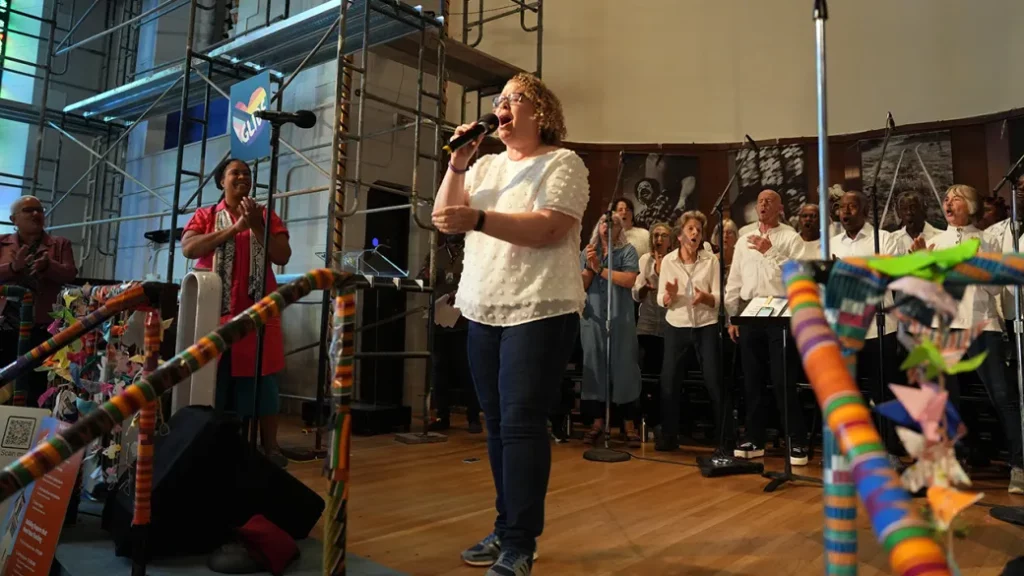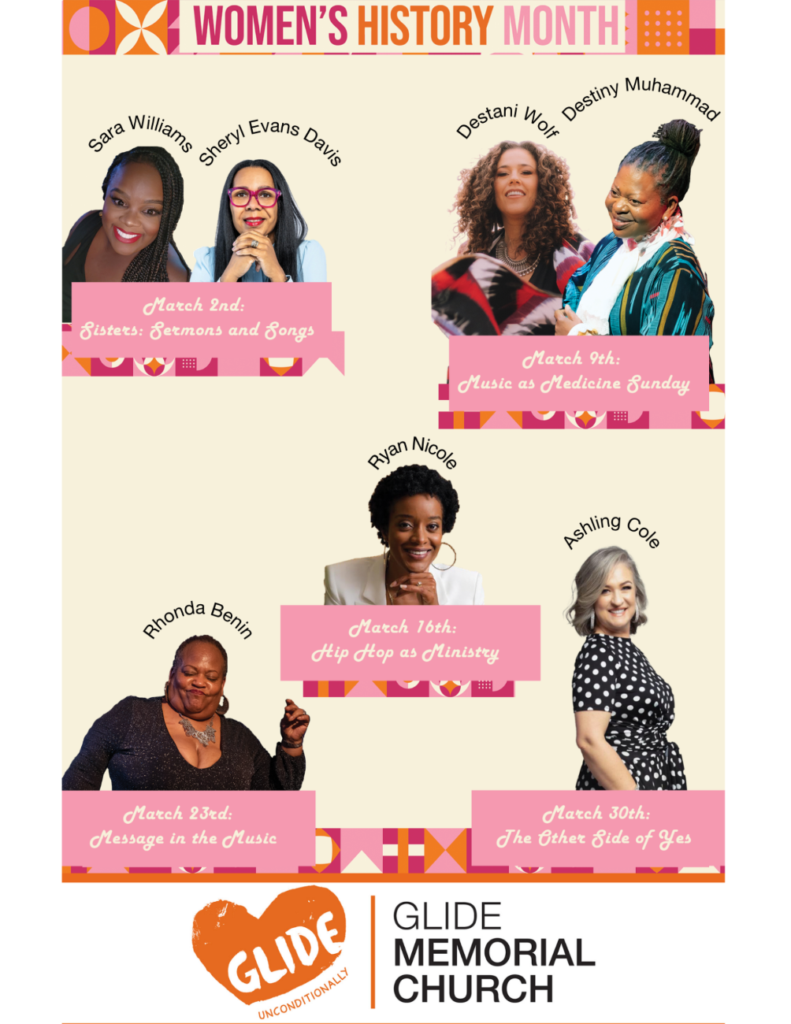
Women’s History Month at Glide Memorial Church highlighted the musical contribution of women in the Bay Area, choosing different local women musicians to feature as special performers at every service in March!
Check out this highlight reel of their amazing sounds, and then read our special interview with Zoë Ellis, our Director of Music Ministries, about the ways these women are making history.
An Interview with Glide’s Director of Music Ministries About How Women Musicians are Making History in the Bay Area
Zoë: It was amazing to receive Minister Marvin K. White’s unconditional support for my vision of creating a month of programming dedicated to women musicians! I arranged this lineup for Women’s History Month as a way for the Glide Memorial Church Music Department to say out loud, “look who we are, look what we do, look who we support.” Glide is a church with world-class music, and our choir is unbelievably committed and dedicated. I wanted to give our choir a chance to work directly with legendary Bay Area Artists. (If you are interested in joining the Glide Ensemble, click here).
All the artists I showcased for Women’s History Month are my activist buddies–or as my kid liked to say when she was little, “actibuddies.” It’s so important to dive into the deeper meaning of their work– music is a way we preserve our history, and music is also a way we MAKE history. Sunday by Sunday, here’s the rundown of the amazing women I invited into our sanctuary.

Sunday 1: Sermons and Songs – Sara Williams and Sheryl Evans Davis
Sara Williams is a preacher’s kid, steeped deeply in the tradition of church gospel music, as well as in the activism of the church. Sara was trained in both classical music and jazz, and she works closely with many popular music artists. However, she’s deeply rooted in the spirituals of the church, and understands how a single church (even just a corner church) can save an entire neighborhood, an entire community!
To understand gospel music and spirituals, you need to understand that songs the slaves sung were how people held on to their African culture and history. The famous song, “This joy that I have,” is about the ultimate decision in the moment of trial and hardship: basically, deciding: “no one else is responsible for my joy but me and my Higher Power.”
The activism of Sheryl Evans Davis has always been deeply rooted in serving the youth. She is currently working on a new educational program called “The Art of Survival,” which debuted in the Commonwealth Club and will continue being offered on an ongoing basis. Sheryl is also the author and illustrator of Free to Sing, a children’s book about a little girl who refuses to stop singing in the face of discouragement. Making our voice heard is always the foundation!
Sunday 2: Music as Medicine – Destani Wolf & Destiny Muhammed
Destani Wolf develops “meditative music,” to use as medicine and self-care. She works with the Cirque do Soleil (most recently on their show Bazzar) and next up will be an amazing Cirque show that explores the themes of immigration. She also works with the BANDALOOP dance troupe, who are amazing: they literally dance off the walls of buildings. BANDALOOP is also working on a big piece on immigration. They use the image of migrating butterfly flocks to emphasize that immigration is beautiful.
It is incredibly tragic how many children are being separated from their mothers at the borders, so defending immigrant’s rights is a cause that resonates with many women and children. When Destani sings for BANDALOOP’s performance on immigration, I will be on the site, hosting art activism for the Butterfly Effect, an organization dedicated to helping children at the border receive an education and obtain asylum.
Destiny Muhammed’s music is completely invested in holding and moving forward the stories of what happened to us when we were enslaved– and taking those stories into the post-slavery era. She’s all about reminding people who they are.
Destiny is deeply spiritual. When she’s in a room, you don’t feel forced to participate in the energy she’s moving– you just know that joining with the energy is the next right thing to do. She makes activism feel so comfortable and natural.. She can MUSIC you into understanding– understanding yourself, what’s around you, and why it’s important to open your mouth. And it’s all just wrapped up in this incredible package of care!
Sunday 3: Hip Hop as Ministry – Ryan Nicole
Ryan Nicole Austin is all the things! Advocate, activist, MC, rapper poet, singer, and songwriter. People turn to her voice on social media to get clarity on political subjects; on her Instagram you might find a song about protecting the waters of the Bay, a detailed commentary on Oakland election results, and a rap about African-inspired Black resistance to injustice, all in one quick scroll.
She recently finished writing a show that is coming out in May, called Cofounders: The Musical, about the story of two unlikely partners (a Black woman and a small town college dropout) taking on the most competitive startup accelerator in Silicon Valley. Ryan Nicole unapologetically celebrates Blackness and even wrote a song explaining the meaning of the phrase, “Black Girl Magic.” The song goes, “Don’t hide your shine, just let it flow, yeah you got it: that Black girl glow!”
Sunday 4: Message in the Music – Rhonda Benin
Rhonda Benin and I both participate in Linda Tillery’s Cultural Heritage Choir: it keeps Black folk music alive. Wherever we go, we use a two-hour show to explain how music lived in different parts of Africa. We explore Afro-Cuban and Yeruba traditions, and show people what happened to that music during transatlantic slave trade.
In slavery, the drums were taken away: all people had were their voices, so they adapted. Historically, the slaves singing in the call and response style was built out of the need to communicate plans. For example, “I’m going to lay down my burdens / down by the riverside,” was a way to communicate that the riverside was the escape location.
Rhonda is a keeper of the idea that absolutely any message can be delivered through music – love, misery, hate, a call to action, anything! And she sings the blues. The blues are hard to sing: you have to know it and mean it to sing it.
Sunday 5: The Other Side of Yes – Ashling Cole
Ashling Cole has a really interesting upbringing – her mother was an Irish activist who would travel to the middle of nowhere to stand in solidarity with Druids, and her father was a longshoreman. Ashling’s activism also lies in education: she’s always teaching people “You have a voice! Get your voice out of your body! Use it well!”
She is a dedicated music educator, and works with an organization called Elevate Oakland, which fights to keep music and art alive in the schools, and gives kids a way to tell their stories.
Music Truly Makes a Difference
This only scratches the surface of the amazing activism and education work women musicians are doing in the Bay Area. I hope it whets your appetite for more, I hope you check out their shows, their projects, and get involved!
Remember: there’s ministry in all music that touches people’s hearts, even secular music. For example, Destiny Muhammed’s song, “We are the ones.” It’s almost like a praise and worship tune: it uses similar cycles of repetition. You say it until you believe it! When my choir sings, I always tell them, “You have no idea if you’re saving a life today. Remember that, GLIDE Ensemble.”